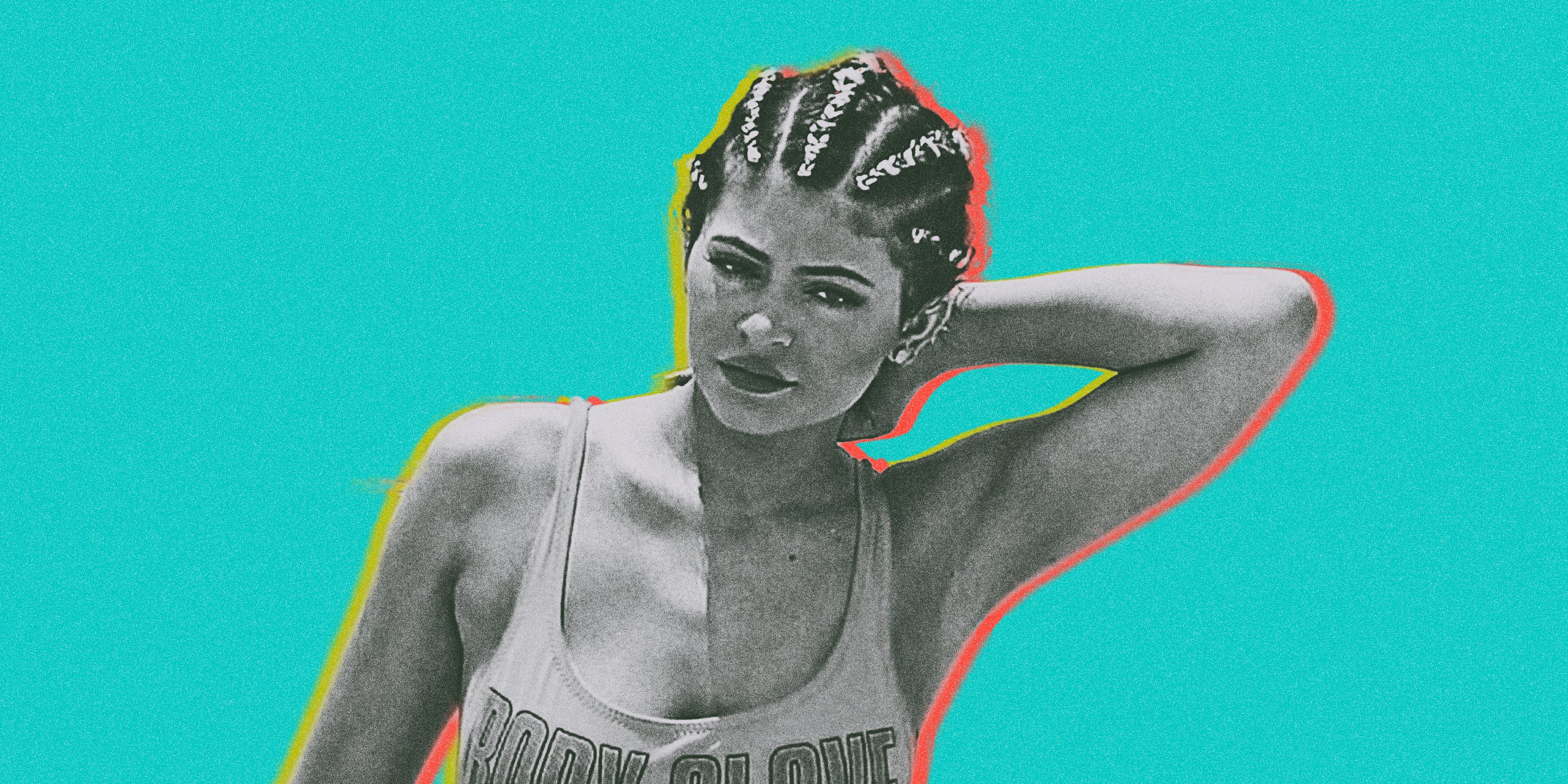
In June 2020, amid nationwide protests against police brutality and systemic racism, Little Women star Florence Pugh took to Instagram to acknowledge her own past contributions to the problem — particularly wearing corn rows as a white girl several years prior. After a friend told Pugh the hairstyle was a form of cultural appropriation, Pugh wrote, "It was true. I could see how Black culture was being so obviously exploited."
Of course, Pugh is far from the only white or non-black celebrity who has worn the hair style — and many have been far less self-aware about it. In July 2015, Kylie Jenner posted a mirror selfie on Instagram of herself in loose grey sweatpants, a sleeveless turtleneck crop top and her hair braided into neat rows, known as cornrows.
"I woke up like disss," she wrote in the caption, unknowingly sparking a heated debate, with some people insisting she was wearing a hairstyle that originated in Black culture as if it were an accessory, while others thought it was just like any other braid.
After Jenner wore them, so did her sister, Kendall Jenner, and her half-sisters, Kim Kardashian West and Khloé Kardashian. We also saw them on Justin Bieber, Hailey Baldwin, and Miley Cyrus. Soon, people were acting like cornrows were some new, exciting trend, swapping the term for "boxer braids" or even "KKW Signature Braids," in the case of Kardashian West. Then there was that video posted by Cosmopolitan with a woman braiding her hair into small, straight cornrows. "You've NEVER seen a braid like this before," the video exclaimed.
Although plenty of non-black celebrities had sported cornrows long before (See: Justin Timberlake, Jared Leto and Christina Aguilera), this time it felt different. This time, the internet could weigh in.
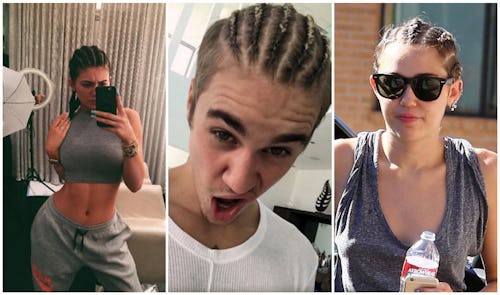
The proliferation of white girl cornrows has certainly had its critics, like Amandla Stenberg, who has insisted that white people have no right to take them as their own without honoring the style's roots in Black history.
"When u appropriate black features and culture but fail to use ur position of power to help black Americans by directing attention towards ur wigs instead of police brutality or racism," Stenberg wrote in an Instagram comment on Jenner's post. Later, she posted a video titled "Don't Cash Crop On My Cornrows," which currently has more than 2 million views.
But still, with these public feuds, thinkpieces. and education surrounding the braids, white people continue to wear cornrows.
So, all of this back and forth sparks the ultimate question: "Is it ever okay for a person who isn't Black to wear cornrows?"
It's a complex question because there are many layers. Is wearing them ever okay? Does it get worse if you try to rebrand them as something else? In order to answer these questions, Mic spoke with Black women about why, or why not, it is okay for people who aren't Black to wear cornrows, and what the real issue is here.
Although Jenner and Kardashian West have both ignored previous opinions on it, let this be a lesson to anyone who's even thinking about braiding their hair this way without giving credit where credit is due.
Would you say that wearing cornrows is technically cultural appropriation?
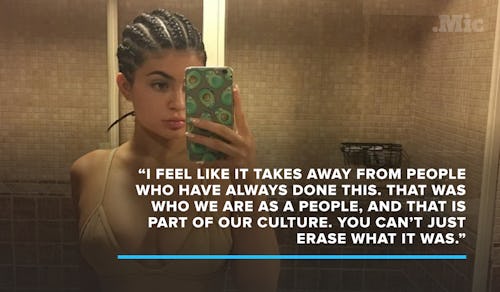
While the internet has certainly come to a consensus on white people wearing cornrows, the women we talked to expressed a much more complex argument. Because of the way our cultures have begun to blur, on the internet and in urban areas, it's more difficult to pinpoint a white person wearing a typically Black style as being culturally appropriative. With all factors considered, sometimes it's difficult to decide.
"It is cultural appropriation, but I think the question I'm getting to is, 'Is cultural appropriation the highest form of flattery?'" Danielle Kwateng-Clark, then a senior editor at StyleBlazer, said in an interview. "So many people are meshing. Cultures are so close to each other, we're getting to a point where cultural appropriation is changing. Is it [cultural appropriation]? Yes. Is it a huge problem? I don't know. It's a big question mark right now."
For then-Teen Vogue digital fashion editor and current Bustle Deputy Fashion Editor Jessica Andrews, on the other hand, it is outright cultural appropriation for a white person to wear cornrows, especially when worn by a person who isn't outspoken about things like police brutality and Black history.
"When you don't value Black lives, but rush to copy Black hairstyles, it's a problem," Andrews said. "Black culture has become increasingly popular — from our hairstyles to our music — but many sit idly by while police disproportionately target and kill Black men and women at alarming rates. That's the very definition of cultural appropriation but also, erasure. Black hairstyles are now considered 'cool.' Black people? Not so much."
For Genevieve Ascencio, the then-vice president of digital at Factory PR, the style on a white person does lean into cultural appropriation, especially because of how much effort it takes for a white person to put their hair into cornrows. It's a lot of effort for a look that ultimately isn't theirs.
"I have a hard time that every single instance is cultural appropriation, but it is more difficult to do cornrows on a white person than on a Black person," Ascencio said. "It's not simple, it doesn't stay very long and you have to do some teasing. You have to get the hair to not be as slippery. It's like, what are you trying to achieve?"
For all of the women we spoke to, calling out the Kardashian/Jenner clan was a no-brainer.
"In the case of the Kardashians, now that they're wearing the cornrows, I personally think it's more of a cultural appropriation," Rajni Jacques, an editorial creative director, said. "I feel like it takes away from people who have always done this. That was who we are as a people, and that is part of our culture. You can't just erase what it was. It's forgetting what it came from. For me, as a young girl, it was just part of life, or when my mom didn't feel like doing my hair."
What is your first reaction when you see a white person wearing cornrows?
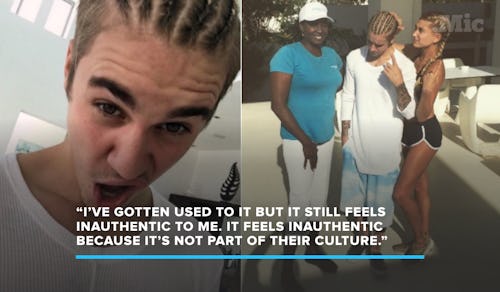
For some women, their first reaction is to ask questions. Lots of questions.
"Like, what look what was she going for?" Ascencio said. "It usually is triggered if it looks really good or really a botched up job trying to pass off as cornrows."
"This is something I've seen more and more over time," Kwateng-Clark said. "Naturally as a human, initially it was visceral, it was like 'Who told you about this? Who did it? Who did your hair, because in your circle, more than likely I don't know anyone who would do that.'"
After the initial line of questioning, though, Kwateng-Clark pointed out that the reason why she feels so strongly has to do with the braid's past, and African history. When she sees a white person wearing them, she needs to know that they understand and acknowledge how and why the style first came to be.
"I've gotten used to it but it still feels inauthentic to me. It feels inauthentic because it's not part of their culture," Kwateng-Clark continued. "It has cultural roots in the African-American community. It's called cornrows so it's derivative of slavery. A quick and easy maintenance hairstyle. It's like any sort of beauty look where it is tied to a certain group of people."
Charlene Dougan, the owner of Mint Salon in New York, chooses to laugh about it. This isn't the first time white people have decided that something in Black culture is cool, after all.
"When I see them, it's like they're trying too hard or trying to be us. Cornrows are definitely ours," Dougan said. "What's funny is that when the Kardashians started braiding their hair, it seemed like they invented something new. But it's like, we started it, though."
So... what's the real problem here? Why do people have such strong feelings?
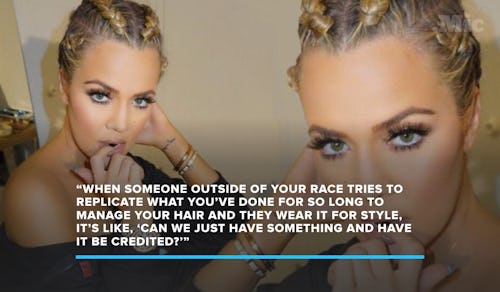
In short: Erasure. White people wearing cornrows and not openly acknowledging the style's past — while also trying to rebrand it or take ownership — is a problem because of what Black people have already experienced wearing cornrows.
As Jacques said: "I remember when I wore cornrows in my senior year in high school. I grew up in a really white, Jewish neighborhood, and I remember everyone being like, 'Why did you do that to your hair?' It was like this thing where it was like, 'Oh that's weird.' Then, a white person does it, and now it's accepted. It releases the term ghetto. It's no longer part of a ghetto look. It's like bamboo earrings."
It stands as one of the most glaring examples of white people adopting a look, and the perception of that look immediately changing. It goes from "ghetto" to cute and chic and fun and hip and fine. There's also the fact that Black women take a lot of pride in their hair and hair styles.
"If I could sum up the black hair experience, it would be the struggle is real," Ascencio said. "You're trying to navigate the world as an African American woman. You grow up thinking your hair is your crown and it is your crowning glory."
And now, people are acting like the style you've literally worn since you were a toddler is a fun and sexy trend.
"When someone outside of your race tries to replicate what you've done for so long to manage your hair and they wear it for style, it's like, 'Can we just have something and have it be credited?'" Ascencio said. "It's like if you're a painter and you see a print that you made, that you created, imagine what it feels like to wear something all your life and then be presented it in your 30s and be told 'this is the newest, greatest thing. Get on board.'"
OK, definitively, is it ever acceptable to wear cornrows as a white person?
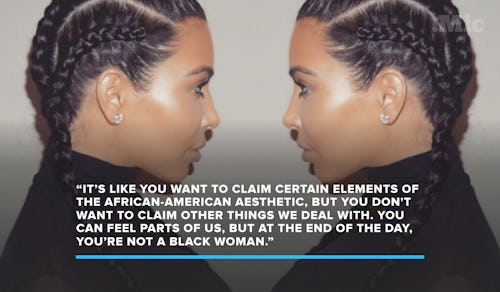
Although this is perhaps the most important question in this discussion, it's also one of the more difficult to answer. The people we asked about this were definitely mixed.
There were the people who do not see it as acceptable for a white person to wear cornrows, like Kwateng-Clark.
"No. If I looked like a white model, and a hairdresser said I want to do cornrows, I would be questioning that," Kwateng-Clark said. "We're really in a very thick racial climate right now. It's like you want to claim certain elements of the African-American aesthetic, but you don't want to claim other things we deal with. You can feel parts of us, but at the end of the day, you're not a Black woman."
And then there are people like Jacques, who think it is only okay when the people who are wearing cornrows acknowledge and openly talk about the history and why they are wearing them.
"For me, what I've seen out there, it's not necessarily okay because they're not crediting it," Jacques said. "But if they were to credit it, and be like 'I love this style because it came from this place,' then I wouldn't mind it. Because people can like what they like. I can't say just because you're white, you can't wear cornrows, but I want you to know the history and where it comes from."
Will it ever be okay for white people to wear cornrows?
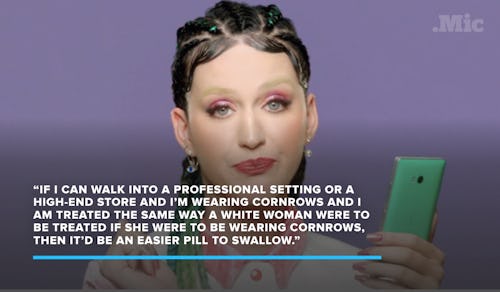
The short answer: White people wearing cornrows will only be okay when cornrows are less stigmatized, and more equality is achieved.
"Here's where it would be okay with me: If I can walk into a professional setting or a high-end store and I'm wearing cornrows and I am treated the same way a white woman were to be treated if she were to be wearing cornrows, then it'd be an easier pill to swallow," Ascencio said. "But I don't think we're labeled the same way. I think the reaction to races wearing the same style is where the problem lies."
Andrews thinks similarly. Once racial equality is achieved, and Black people aren't targeted because of how they wear their hair, then maybe white people can wear cornrows. But just maybe.
"When we live in a world that denies Black people basic human rights like the right to a fair trial, when unarmed Black citizens are shot dead by police with children in the backseat, I think the conversation should be less about borrowing our hairstyles, and more about fighting for equality and justice under the law for all people," Andrews said.







